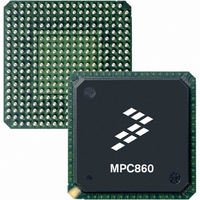MC68EN360ZQ25VL Freescale Semiconductor, MC68EN360ZQ25VL Datasheet - Page 541

MC68EN360ZQ25VL
Manufacturer Part Number
MC68EN360ZQ25VL
Description
IC MPU QUICC 32BIT 357-PBGA
Manufacturer
Freescale Semiconductor
Datasheets
1.MC68EN302AG20BT.pdf
(8 pages)
2.MC68EN360VR25L.pdf
(14 pages)
3.MC68EN360VR25L.pdf
(2 pages)
4.MC68EN360ZQ25VL.pdf
(962 pages)
Specifications of MC68EN360ZQ25VL
Processor Type
M683xx 32-Bit
Speed
25MHz
Voltage
3.3V
Mounting Type
Surface Mount
Package / Case
357-PBGA
Family Name
M68xxx
Device Core
ColdFire
Device Core Size
32b
Frequency (max)
25MHz
Instruction Set Architecture
RISC
Supply Voltage 1 (typ)
3V
Operating Supply Voltage (max)
3.3V
Operating Supply Voltage (min)
2.7V
Operating Temp Range
0C to 70C
Operating Temperature Classification
Commercial
Mounting
Surface Mount
Pin Count
357
Package Type
BGA
Lead Free Status / RoHS Status
Contains lead / RoHS non-compliant
Features
-
Lead Free Status / Rohs Status
Not Compliant
Available stocks
Company
Part Number
Manufacturer
Quantity
Price
Company:
Part Number:
MC68EN360ZQ25VL
Manufacturer:
Freescale Semiconductor
Quantity:
10 000
- MC68EN302AG20BT PDF datasheet
- MC68EN360VR25L PDF datasheet #2
- MC68EN360VR25L PDF datasheet #3
- MC68EN360ZQ25VL PDF datasheet #4
- Current page: 541 of 962
- Download datasheet (4Mb)
TXE—Tx Error
RCH—Receive Character
BSY—Busy Condition
TX—Tx Buffer
RX—Rx Buffer
7.10.20.15 BISYNC MASK REGISTER (SCCM). The SCCM is referred to as the BISYNC
mask register when the SCC is operating as a BISYNC controller. It is a 16-bit read-write
register that has the same bit format as the BISYNC event register. If a bit in the BISYNC
mask register is a one, the corresponding interrupt in the event register will be enabled. If
the bit is zero, the corresponding interrupt in the event register will be masked. This register
is cleared upon reset.
7.10.20.16 SCC STATUS REGISTER (SCCS). The SCCS is an 8-bit read-only register that
allows the user to monitor real-time status conditions on the RXD line. The real-time status
of the CTS and CD pins are part of the port C parallel I/O.
CS—Carrier Sense (DPLL)
7.10.20.17 PROGRAMMING THE BISYNC CONTROLLER. There are two general tech-
niques that the software may employ to handle data received by the BISYNC controllers.
The simplest way is to allocate single-byte receive buffers, request (in the status word in
each BD) an interrupt on reception of each buffer (i.e., byte), and implement the BISYNC
protocol entirely in software on a byte-by-byte basis. This simple approach is flexible and
may be adapted to any BISYNC implementation. The obvious penalty is the overhead
caused by interrupts on each received character.
sage that was in progress when the command was issued. It will be set immediately if no
message was in progress when the command was issued.
An error (CTS lost or underrun) occurred on the transmitter channel.
A character has been received and written to the buffer.
A character was received and discarded due to lack of buffers. The receiver will resume
reception after an ENTER HUNT MODE command.
A buffer has been transmitted. This bit is set as the last bit of data or the BCS (if sent)
begins transmission.
A receive buffer has been closed by the CP on the BISYNC channel.
This bit shows the real-time carrier sense of the line as determined by the DPLL if it is
used.
0 = The DPLL does not sense a carrier.
1 = The DPLL does sense a carrier.
Freescale Semiconductor, Inc.
—
7
For More Information On This Product,
—
6
MC68360 USER’S MANUAL
Go to: www.freescale.com
—
5
—
4
—
3
Serial Communication Controllers (SCCs)
—
2
CS
1
—
0
Related parts for MC68EN360ZQ25VL
Image
Part Number
Description
Manufacturer
Datasheet
Request
R
Part Number:
Description:
Manufacturer:
Freescale Semiconductor, Inc
Datasheet:
Part Number:
Description:
Manufacturer:
Freescale Semiconductor, Inc
Datasheet:
Part Number:
Description:
Manufacturer:
Freescale Semiconductor, Inc
Datasheet:
Part Number:
Description:
Manufacturer:
Freescale Semiconductor, Inc
Datasheet:
Part Number:
Description:
Manufacturer:
Freescale Semiconductor, Inc
Datasheet:
Part Number:
Description:
Manufacturer:
Freescale Semiconductor, Inc
Datasheet:
Part Number:
Description:
Manufacturer:
Freescale Semiconductor, Inc
Datasheet:
Part Number:
Description:
Manufacturer:
Freescale Semiconductor, Inc
Datasheet:
Part Number:
Description:
Manufacturer:
Freescale Semiconductor, Inc
Datasheet:
Part Number:
Description:
Manufacturer:
Freescale Semiconductor, Inc
Datasheet:
Part Number:
Description:
Manufacturer:
Freescale Semiconductor, Inc
Datasheet:
Part Number:
Description:
Manufacturer:
Freescale Semiconductor, Inc
Datasheet:
Part Number:
Description:
Manufacturer:
Freescale Semiconductor, Inc
Datasheet:
Part Number:
Description:
Manufacturer:
Freescale Semiconductor, Inc
Datasheet:
Part Number:
Description:
Manufacturer:
Freescale Semiconductor, Inc
Datasheet:











